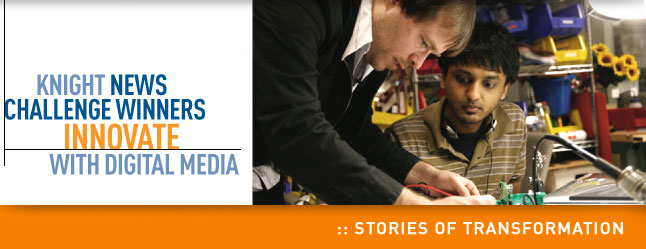
Knight News Challenge Winners Innovate With Digital Media
Article from Knight Foundation’s 2006 Annual Report
While cyberspace takes great advantage of the virtual, it overlooks a hard reality.
“We don’t vote virtually, we don’t elect a virtual president, we don’t pay virtual taxes, we don’t drive on virtual roads,” says Gary Kebbel, Knight’s journalism program officer. “Our lives are organized around geography … where we live and work, in real life, with real people coming together to work on community problems.”
And we asked: Who will do in the 21st century what the Knight brothers did in the 20th century with their newspapers? Who will use digital news and information to build community?
That’s the essence of the Knight News Challenge, a five-year, $5 million-per-year contest open to anyone, anywhere capable of developing new ways to use news and information to connect people to real geographic places.
The building blocks are geography, digital media and open source. Or as Eric Newton, Knight’s vice president/Journalism Program, puts it: “Nerds, news and neighborhoods.”
The initial winners are a distinct and daring group of organizations and individuals with big ideas. They represent an arc from MIT to MTV, from an innovation incubator being built by seven women journalism educators to a network of bloggers generating a global conversation, with contributions from Ghana, Fiji and Tajikistan.
The News Challenge’s first-year entry pool included 1,650 applications seeking up to $4 billion. They came from people as young as 8 years old, from corporations and major education institutions, from entrepreneurs and main-stream media outfits. More on the winners is at newschallenge.org. Letters of inquiry for the 2007 round can be submitted beginning July 1.
With its New Challenge award, MIT is creating a Center for Future Civic Media to test and investigate civic media in local communities. The center pairs MIT’s renowned and inventive Media Lab with the Comparative Media Studies Program, which identifies the cultural and social potential of media change.
“This is a school that’s filled with geeks of different sorts,” says the Media Lab’s Chris Csikszentmihalyi. “It’s a remarkable place in terms of finding alternative roles of technology that you wouldn’t see anywhere else in the world.”
A great many of the ideas judged by a panel of digital media pros addressed the contest’s central opportunity.
In December 2005, Geoff Dougherty founded Chi-Town Daily News, an online newspaper written by and for Chicagoans. The Daily News uses citizen journalism, hyperlocal news and multimedia.
“I was noticing that there was a real gap in local coverage and there were a lot of neighborhoods and issues going uncovered,” he said.
Many took the opportunity to get young citizens engaged in community and democracy.
MTV will deploy mobile youth journalists – MYJos – across the 50 states with digital devices to cover the 2008 presidential election. The best of the mobile reports will be featured by MTV.
“Every young person, no matter what issue matters to them, can now have a platform to get other young people to become educated about those issues, to connect and collectively now take action,” says Ian Rowe, MTV’s vice president of strategic partnerships and public affairs – and a new member of Knight’s Journalism Advisory Committee.
One winning idea, spearheaded by Diane Lynch at Ithaca College, lifts a page from the web development playbook by forming a learning community among journalism educators and students at seven U.S. campuses. The Innovation Incubator Project partners will collaborate to create models of participatory community news production, making them widely available through a partnership with the Online News Association (ONA). Lynch calls the project “a contemporary petri dish.”
College students have a huge advantage, she says. “They’re digital natives. They get it. They live online. They understand community, they understand social networking. We don’t have to explain it to them.”
First-year winner Adrian Holovaty, at age 26 a veteran of creating such interactive web applications as the award-winning chicagocrime.org, lauds the spirit of the News Challenge. “I think it is a great contest because it is an encouragement of innovation in the journalism industry … an industry that sorely needs it.”
For further information
- Knight News Challenge web site: http://www.newschallenge.org
- MIT Media Lab: http://www.media.mit.edu/
- Chi-Town Daily News: http://www.chitowndailynews.org/